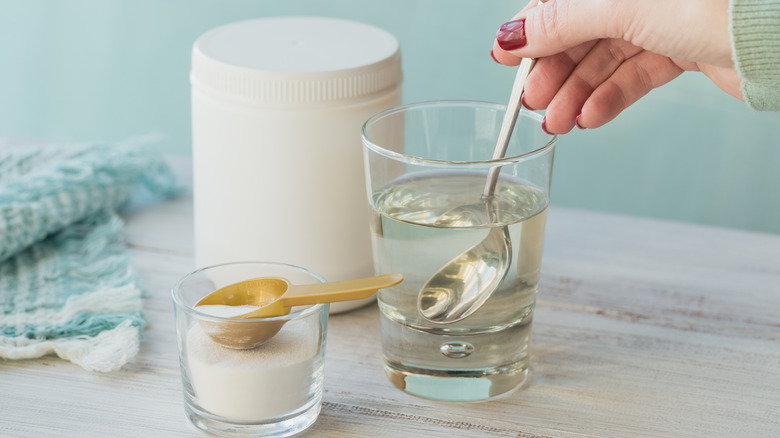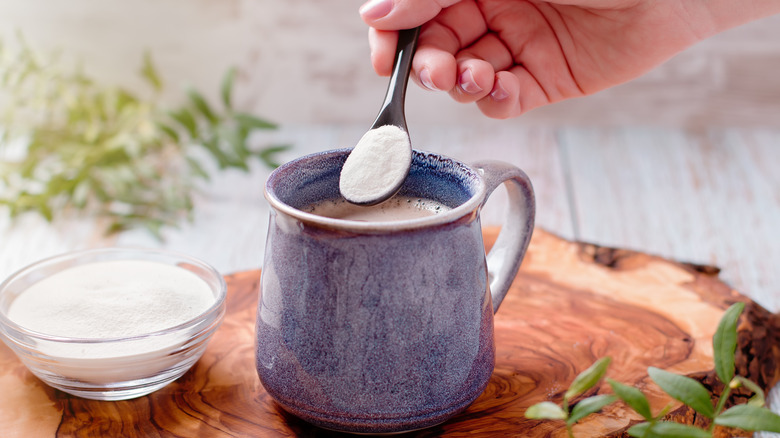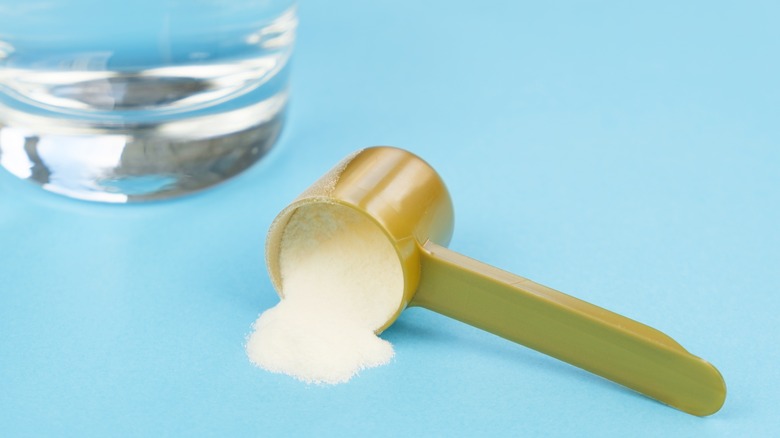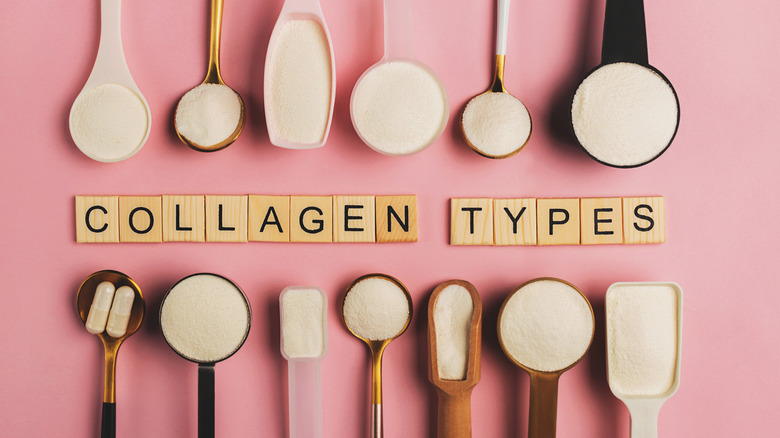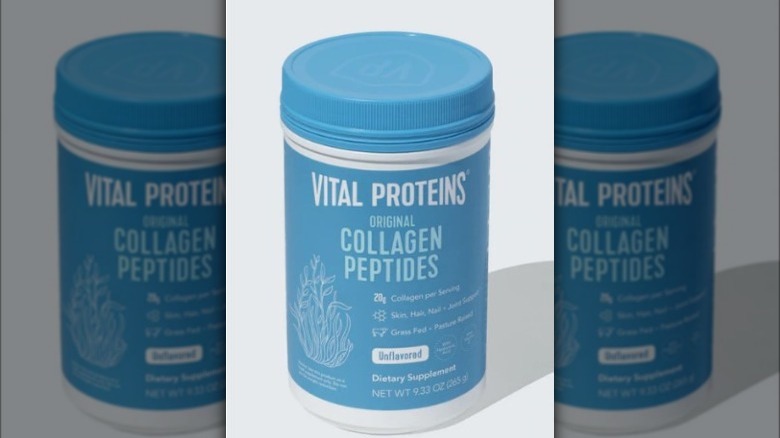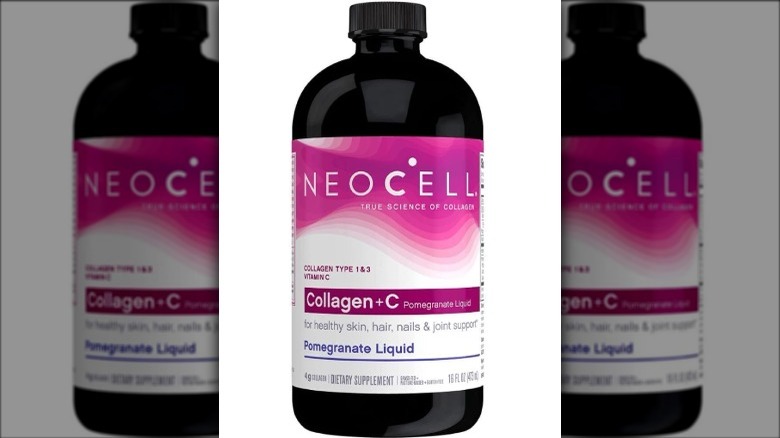Liquid Collagen Or Powder: What's The Difference?
We may receive a commission on purchases made from links.
When you hear "collagen," you probably think of skincare. If you take a little stroll down the beauty aisle, you will see numerous collagen creams and serums. But collagen is more than just a skincare ingredient. According to Medical News Today, "collagen is the most abundant protein in the human body, found in the bones, muscles, skin, and tendons." It is what holds everything in the body intact, so it does more for you than help your skin. Collagen is what gives our body structure, per Healthline. Did you know collagen means "glue" in ancient Greek? (via KDVR). Therefore, it plays a vital role in our overall well-being. As we get older, our body makes less collagen. We can get collagen from animal sources like chicken and fish skin and bone broth.
Collagen supplements are gaining more popularity nowadays, with celebrities talking about them and the various brands that market them for health. But do they work? A study published in the International Journal of Dermatology (posted at the National Library of Medicine) showed that taking hydrolyzed collagen supplements does help with improving skin elasticity and reducing fine lines. Now that we know that collagen supplements do have benefits and are ready to add them to your diet, you have the option to choose between liquid and powder collagen. Here are some key differences to make the selection process easier.
Liquid collagen is more travel-friendly
The first and most obvious difference between liquid and powder collagen is the form itself. Powder collagen turns into liquid collagen when you mix it with liquids like water or coffee. Liquid collagen is available in a pre-made drink, and powder collagen needs a beverage for you to mix with, per Mind Body Green. If you are looking for a quick drink, liquid collagen is more convenient ,as you won't need to mix it yourself (not that it takes too long).
The body more readily absorbs fully hydrolyzed liquid collagen
According to Verywell Health, the liquid forms of the supplement have hydrolyzed collagen (aka collagen peptides), which has already been broken down into smaller proteins, making it easier for your body to absorb. According to Vital Proteins, many powder collagen supplements are hydrolyzed; the only difference is whether it is fully or partially hydrolyzed, depending on the collagen source. The brand's fully hydrolyzed collagen is Collagen Peptides, which easily dissolves in hot and cold liquids. Their partially hydrolyzed collagen is Beef Gelatin, which needs hot beverages to dissolve fully.
Powder collagen might be more effective
Liquid collagen is diluted, whereas powder collagen is not. Isa Kujawski, registered dietitian and founder of Mea Nutrition, told Mind Body Green, "Liquid forms of collagen typically have less collagen per serving than the powdered alternative." Of course, it depends on the collagen source and brand, but in general, powder collagen is more concentrated. While there is no set daily recommended dose of collagen yet, the outlet gave the example of trying to take 10 grams of collagen. You would have to drink a lot of liquid collagen to get 10 grams versus the same in powder.
Powder collagen is more eco-friendly and cheaper
Liquid collagen drinks are easily portable, as they come in individual servings, so they might be adding more waste to the planet; in that regard, powder collagen is more sustainable, as they come in a larger container, and you can get multiple uses out of one, per Mind Body Green. It is important to consider your budget when it comes to collagen as well. According to Native Path, the monthly cost of liquid collagen ranges between $42.99 and $160, while the average price of powder collagen is about $30. It is assumed liquid collagen is more expensive as there aren't as many options as powder collagen, so you only have so many to choose from.
Type of collagen matters, whether it is liquid or powder collagen
Before choosing a liquid or powder collagen, it is helpful to learn about the types of collagen in the supplement and what it helps with. According to Medicine Net, there are mainly three types of collagen: Type I, Type II, and Type III. Type I collagen is the most abundant type of collagen in the body. It's present nearly everywhere — the skin, hair, and tendons, but not in the cartilage (via Mind Body Green). Type II collagen is one of the main parts of cartilages responsible for maintaining a healthy skeletal system. Type III is in our reticular fibers (such as bone marrow), and tends to exist alongside Type I.
It is important to note that the source of collagen used in either powder or liquid collagen depends on the brand. However, according to Mind Body Green, most liquid collagen drinks have marine collagen, rich in Types I and III collagen. Grass-fed bovine collagen is rich in Type I and III. Native Path shared that it is easier for the body to absorb grass-fed bovine collagen than marine collagen. Your dietary restrictions and type of collagen can help the selection process. You should check the ingredients list to see what type of collagen the powder or liquid is formulated with to choose the right one for your needs and within your budget.
Best powder collagen
Collagen powders are all the rage, and there are many brands coming up with collagen powder supplements. However, some brands are considered better than others. Verywell Health has chosen Vital Proteins Collagen Peptides as the best overall collagen powder because it is NSF certified for sport, ConsumerLab approved, and an excellent protein source. (Jennifer Aniston is a fan.) It contains Types I and III collagen along with hyaluronic acid, which benefit your skin. However, it does not have Type II collagen for your cartilage that helps your joints.
Forbes' pick is Further Foods Chocolate Collagen Peptides because it is tasty, easy to dissolve in hot coffee (as it is hydrolyzed collagen from bovine), and has Type I and III collagen. Dr. Melina Jampolis told the outlet, "It also contains reishi mushrooms, which support healthy immune function, and cocoa powder, which is an antioxidant." Healthline recommends Anthony's Hydrolyzed Marine Collagen Peptides because it contains only one ingredient, is non-GMO, gluten-free, and does not have any synthetic ingredients. It can be a fantastic protein supplement, as each serving has 13 grams of collagen.
Best liquid collagen
All collagen powders turn to liquid once mixed with water or another beverage of your choice, but if you are traveling and need to grab a quick dose of collagen, you can always choose liquid collagen. Find This Best recommends AminoSculpt Original Liquid Collagen Peptides 18,000,000 MCG because it contains a "powerful dose of pure Type I collagen" that helps your muscles, skin, and hair. At 18 grams of collagen peptides per serving, they claim to have twice the collagen serving as powder collagen.
Greatist is a fan of Neocell Collagen + C Pomegranate Liquid, which contains Types I and III collagen. It is infused with vitamin C and other antioxidants for extra benefits. They love this liquid collagen because it is easy to carry around, has a fruity taste, and is affordable. Vogue recommends The Beauty Chef Collagen Inner Beauty Boost because the brand's founder, Carla Oates, said, "The Collagen Inner Beauty Boost is rich in antioxidants like acai, papaya, goji berry, and blueberry, alongside zinc and vitamin C to help collagen synthesis." According to The Beauty Chef, this liquid collagen can give you beautiful skin and help your gut.
